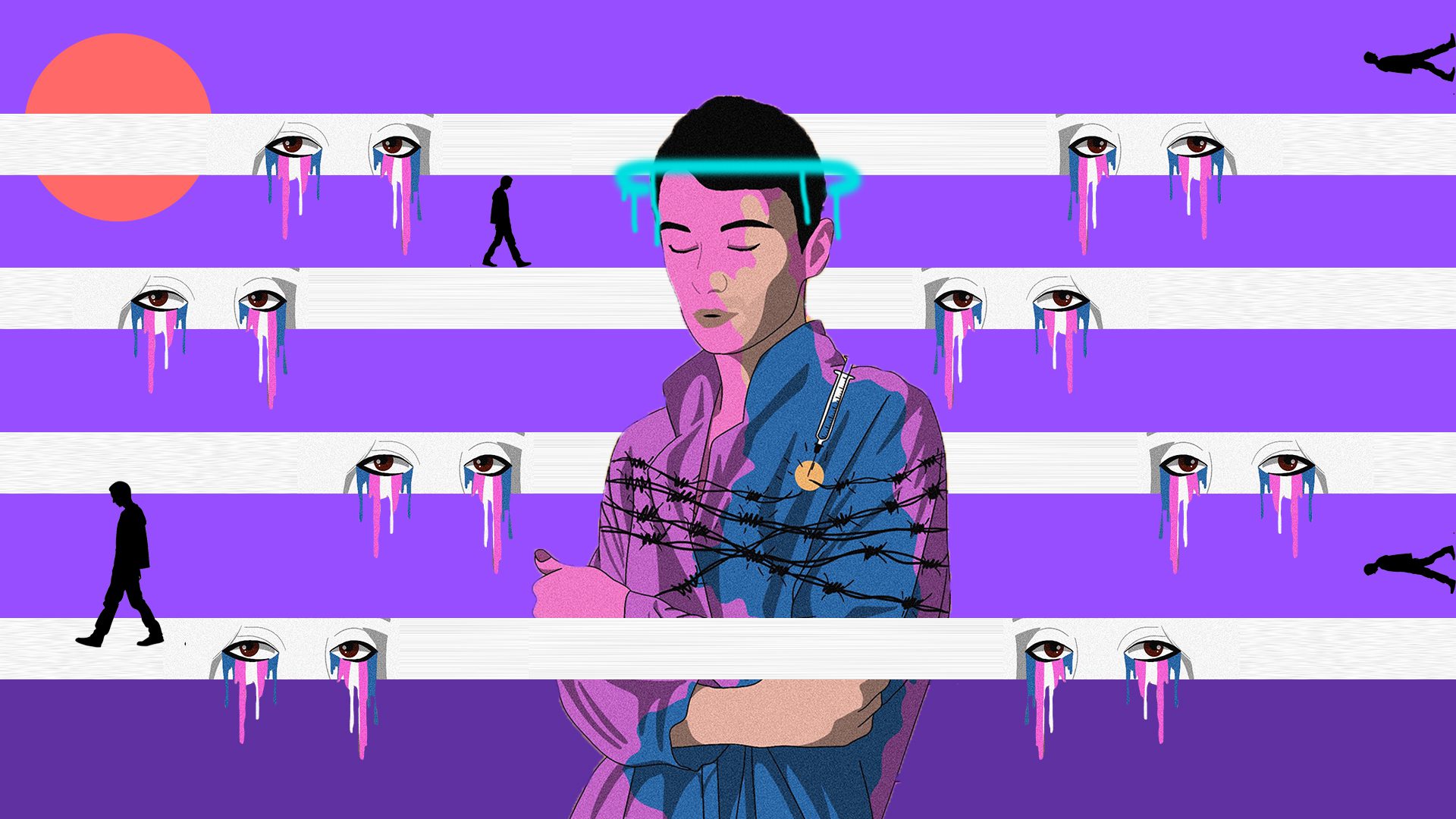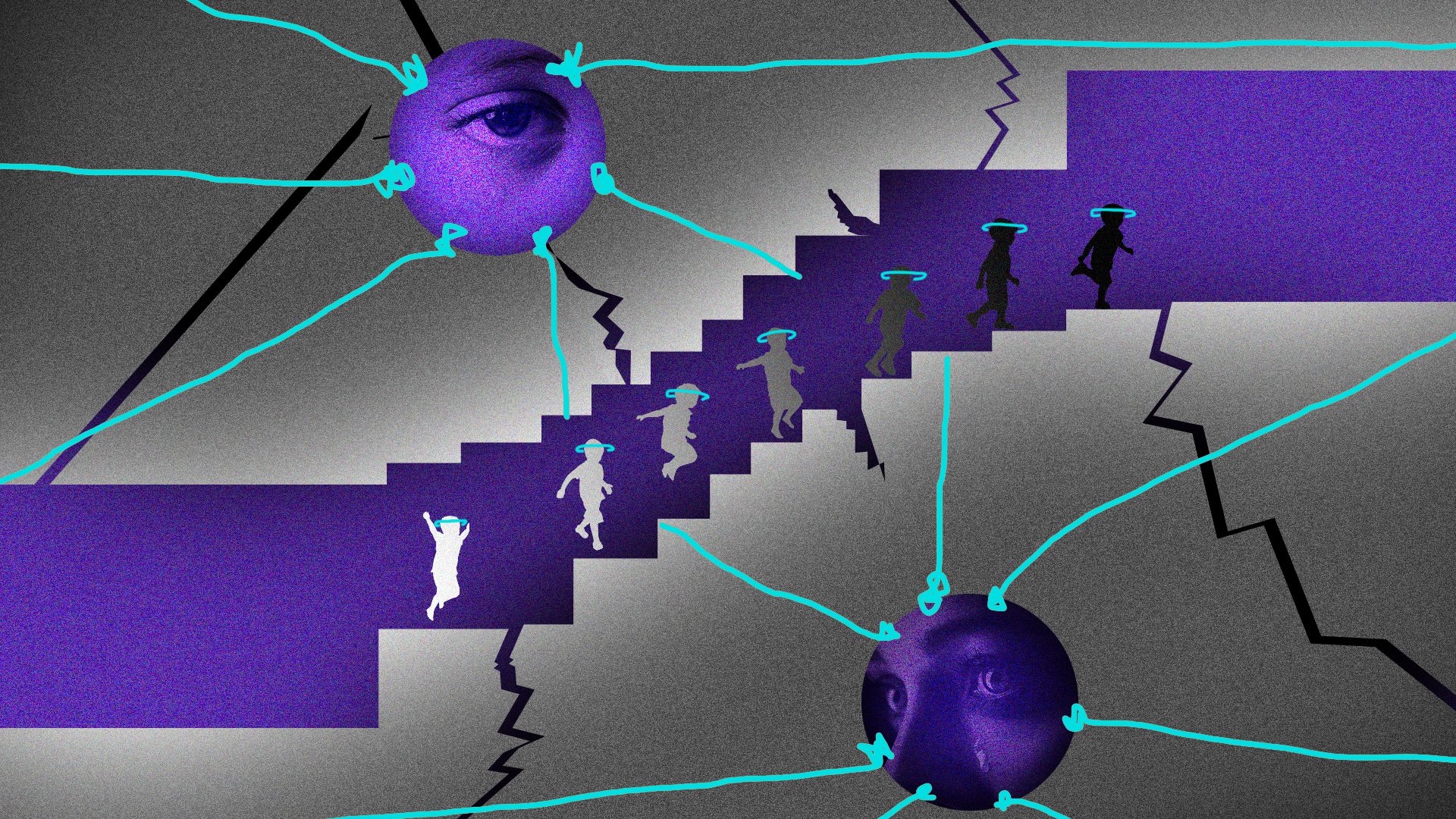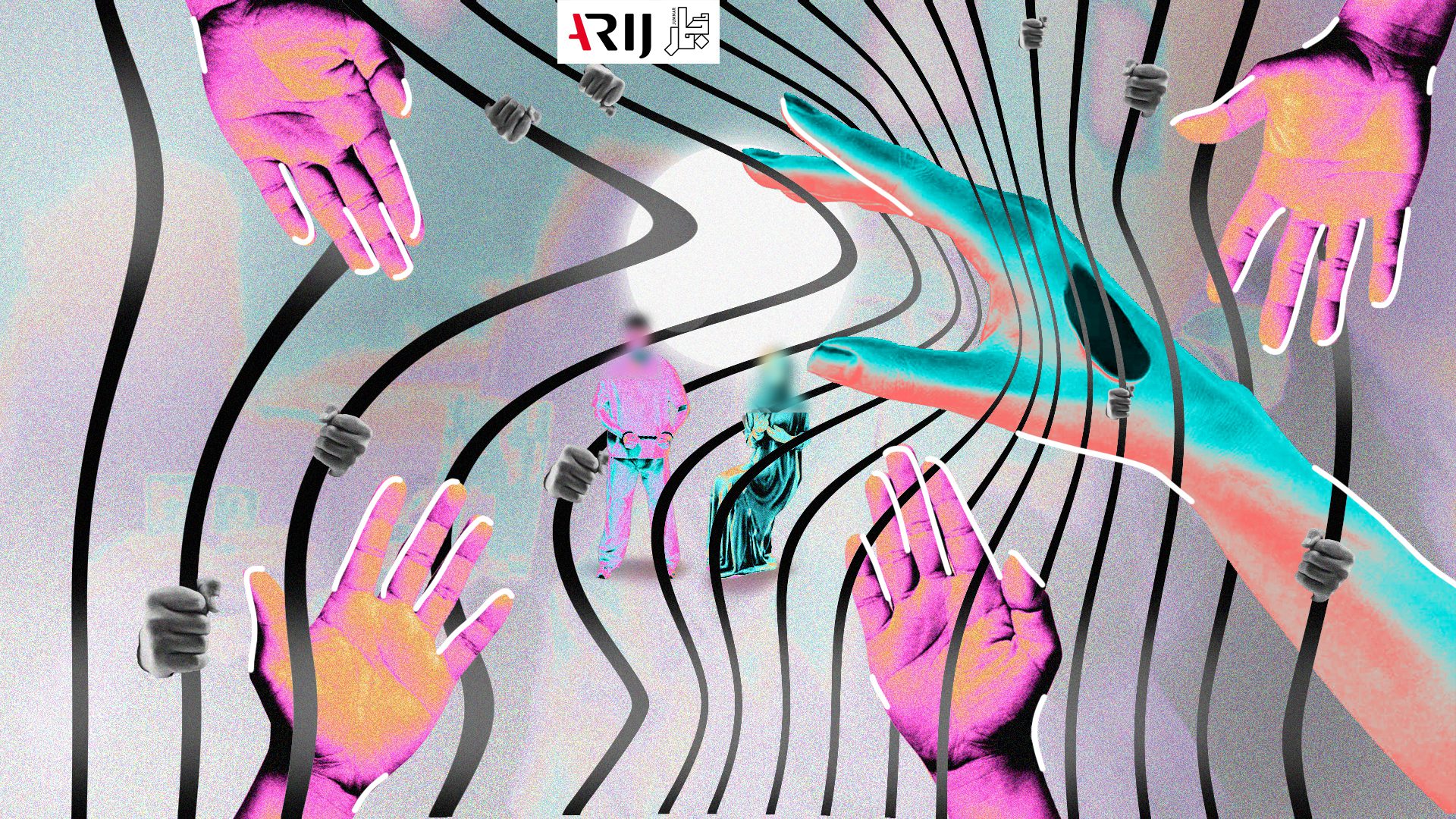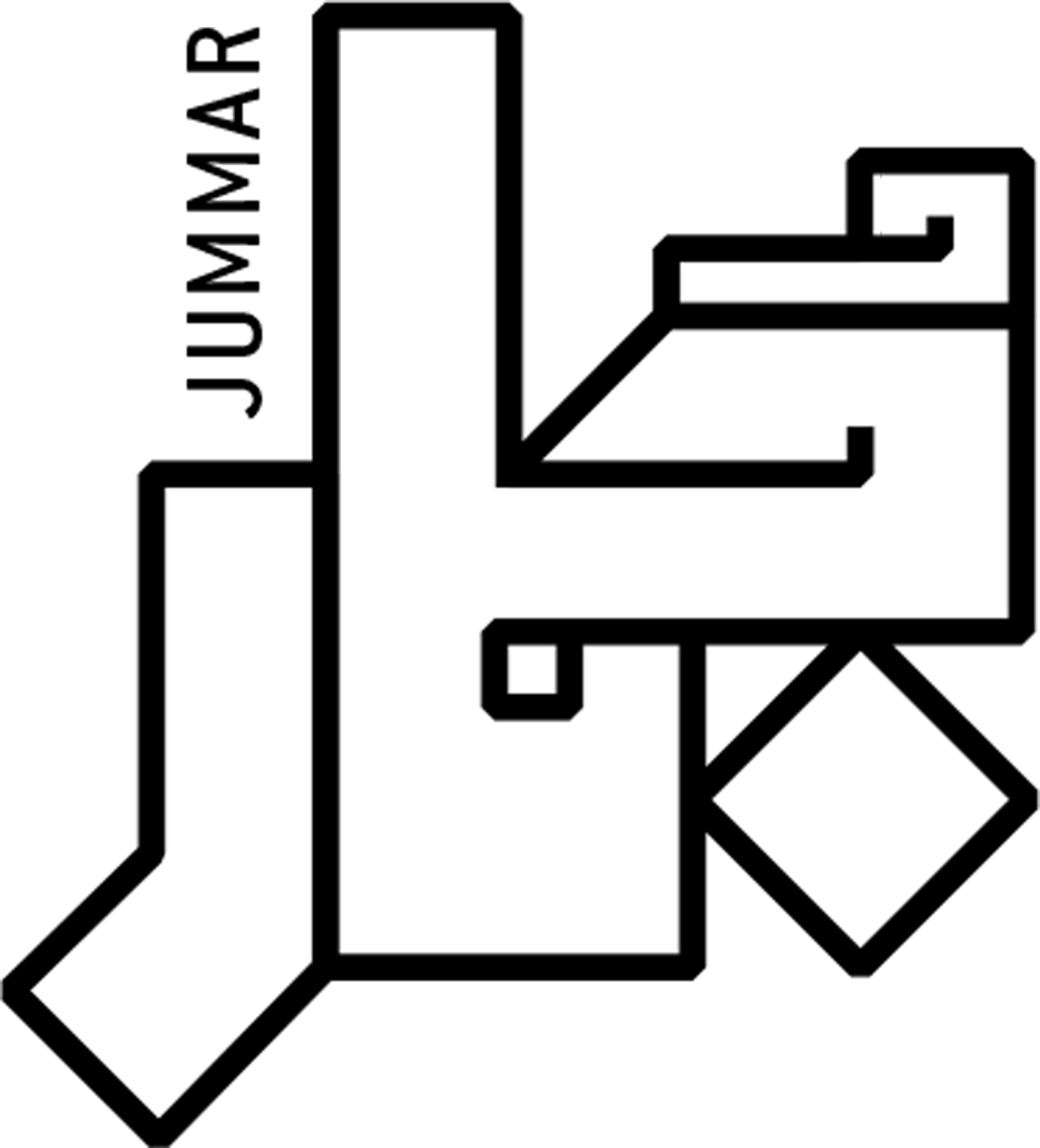Excluded Citizens: The Life of Iraqi Roma between the City’s Ruins and Rejection by the Authorities
25 Jul 2023
Since 2003, the Iraqi Roma have been facing the toughest experience of displacement of their entire demographic group, migrating across the country. Their citizenship is an “exception”, their daily life is a struggle, and the authorities do not survey them or help them to survive. How are the Roma trying to rid themselves of the “representations of inferiority” and the “social stigma” that have been haunting them for centuries?

In a forgotten derelict area of wasteland, about 400 Romanis (also referred to as Gypsies) are trying to settle near the Katun Al-Razi area on the western edge of Baquba. It is just one of similar groups wandering the country searching for a haven.
“I cannot defend my daughter who goes on the streets to sell Kleenex because I have nothing, no weapon, not even a knife. I am a man who has neither land nor property, the only thing I did have was a heart attack”, said Abu Souha, a Roma man, weeping at the miserable living conditions of himself and his daughter in Baquba, after she was subjected to group sexual harassment.
The Roma of Diyala are just one of the Iraqi Roma groups. They face rejection, discrimination, and severe social exclusion amidst deliberate negligence by local and federal authorities that attempt to negate them and keep them away from established population centres or investment zones.
The Katun Al-Razi group in Diyala settled, as a displaced people, in an abandoned government area on the north-eastern belt of the Kanaan district about ten years ago. They live in what might have been a camp, in “poor quality tents”, as described by Farid Abou Hawraa.
In May 2022, the government displaced them to establish a real estate investment project in a vacant area. Security forces removed the Roma’s camp in Kanaan, and the investor built very low-cost constructions made of cheap bricks and roofs of aluminium and iron for them. They were constructed as temporary shelters in the middle of an area of ruined buildings and a landfill on the outskirts of Al-Katun, near Al-Razi public hospital.
“They (the Roma residents) might have come from Baghdad and other southern provinces. We do not know”, Abdullah Al-Hayali, Baquba’s District Commissioner, told Jummar.
Since 2003, Iraqi Roma have been going through the most arduous displacement experience of any group, migrating across the country, trying to permanently settle in a safe place and free themselves from “representations of inferiority” and “social stigma” that have haunted them for centuries.
Romanis: sub-human life
“Even dogs would not accept living the way we live”, said a Roma woman who refused to give her name.F
A report by the International Human Right Council submitted to the UN Assembly in May 2015 described the conditions of Roma communities in central and southern Iraq as “the most miserable in all Iraq […] Romanis live in mud houses that have no windows, and they do not have electricity, clean water, or healthcare services. They do not get enough food and have no access to social security services”. This applies to the “slums” of Diyala’s Roma.
As a result of the intimidation of the authorities, Roma families were forced to live in the middle of a landfill site in Katun Al-Razi. The area is full of derelict structures and brackish water and sewage that has gathered in pits infested with mosquitos and flies which continually buzz around, transmitting various diseases. A young woman died at the end of last year after contracting a contagious skin disease from these infestations.
“My thirty-year-old sister-in-law had the Baghdad boil (a common name for Cutaneous Leishmania) in her leg caused by the unsanitary conditions she was forced to live in. We were not able to treat her, and she died. The government has forgotten us. They wish us dead so they can get rid of us”, said Huda Hadi, a Roma woman in her fifties.
Diyala’s Romanis consist of about sixty-five families, including forty-eight families in the Katun Al-Razi group, which are now called “Qaryat Al-Ghajar” [Arabic for the Roma Village]. The other seventeen families live separately in the western areas of Baquba, and some moved to Kirkuk or Baghdad, according to District Commissioner of Baquba, Al-Hayali.

Women of the Katun Al-Razi Roma slums suffer terrible health conditions that deteriorate daily. Three women interviewed by Jummar represented others who preferred not to give their names. They put their faces in their hands and silently bemoan their humiliated state of being rather than make complaints in vain.
“Romanis face difficulties in accessing their economic, social, and cultural rights, and their living environment is characterised by unsanitary conditions and disease with no potable water network”, according to the report on Iraq’s compliance with the International Convention on the Elimination of All Forms of Racial Discrimination submitted to the international community.
The three Roma women interviewed suffer from diseases, poverty, neglect, discrimination, and horrific psychological traumas. One of them described how her fractured hand was not appropriately splinted in the hospital due to discrimination and negligence which has caused complications that could lead to its amputation if she is not provided with surgical intervention and responsible care.
Umm Abbas is another sick woman who is unable to scrape together two million dinars to treat the cysts above her uterus, which could lead to fatal complications if not removed. The third is a lady consumed by old age, leaving her with severe arthritis that makes her unable to walk.
The Roma of Iraq remain marginalised and excluded from governmental or international protection, as they were not included in the displacement and shelter camps funded by the Ministry of Migration and Displacement or the International Organisation for Migration (IOM).
“There is a broad failure in recognising their status as internally displaced persons fleeing conflict and violence in Iraq. This proves their complete marginalisation […] many officials know nothing about the internal displacement of Romanis, and even deny their existence sometimes”, according to a study published in December 2021 by the Researching Internal Displacement.
From singing and dancing to begging
“Mendicancy is our only way to earn a living today”, says Umm Ali, a woman in her fifties.
Roma of Iraq roamed cities working as singers, and dancers, telling fortunes, making silver jewellery, and treating teeth using primitive methods. Authorities have constantly avoided helping them to settle or change their lifestyle for decades, fearing a demographic change. Moreover, urban and rural residents refuse to associate with them and reject them because of stereotypical representations and the fact that they are stigmatised by shame and the ambiguity of their racial origins.
“Before 2003, we made a living from singing and dancing. Now, we live by begging and the aid we get from the tribes and generous people of the Kanaan and Shahraban tribes […], we visit them monthly to collect aid because no one will hire us”, says Huda.
Lacking the education, job skills, and tribal affiliations required to maintain social status in Iraq, the Roma remain on one of the lowest rungs of the Iraqi social ladder. “We are now poor, and political parties have abandoned us. Unlike before, dancing and music has been appropriated through new musical instruments, satellite channels, DJs, and other things have appeared. Our profession is extinct. There are Romanis in Baghdad still working in that field, but they are few”, Badriya told us.
Salah Mahdi, Director of the Diyala office of the Human Rights Commission, confirmed that most Iraqi Roma abandoned singing and dancing, as it is no longer suitable within the current situation due to their fear of being targeted because of their profession, so they discontinued after being displaced from several locations.



Umm Abbas is a mother and caregiver of fifteen children, her own and those of her husband’s deceased first wife. Every day, she collects between ten and twenty thousand dinars from begging. “Look at our barefoot and naked children in this cold. How can we provide them with what they need?” she says with a despondent face full of misery.
United Nations reports confirm that Roma women in Iraq are highly exposed to sexual violence and are at high risk of exploitation. Nineteen-year-old Souha Hussein, one of Katun Al-Razi’s young women, says she is constantly subjected to harassment and attempts of sexual assault. “I sell Kleenex on the streets, and everyone harasses me. They follow me with their cars at times, and I have run a long distance to reach home to get rid of them”.
“There is no legal impediment to employ Romanis, but the problem is they have no educational attainment, which hinders them from finding jobs”, according to Al-Hayali, Baquba’s District Commissioner.
Although the Iraqi government launched a subsidy system for unemployed and poor families, known as the Social Welfare Network, the programme does not include the Roma.
Displacement is an obstacle to education
Among the mothers desperate to earn a living, forgotten children of the Roma slums play among pits of stagnant water and piles of waste, suffering from smallpox and other contagious and endemic diseases transmitted from one to another without any healthcare or regular examinations.
The majority of Iraqi Roma are illiterate, while “their children are forced to engage in informal work or resort to mendicancy”, according to a report by the International Human Rights Council in 2015.
The administration of the nearest primary school attended by some of the displaced children in Katun Al-Razi implicitly discriminates against them by concealing their identity, “to protect them from getting bullied and verbally and physically abused”, according to Salah Mahdi, Director of the Diyala office of the Human Right Commission.
Most children of the Roma group in Diyala and throughout Iraq drop out of school. They are then forced to beg or scavenge waste as a humiliating way of living that often exposes them to sexual exploitation.
“It is remarkable that Roma children are peaceful, excel academically, and are committed to education […] Unfortunately, they drop out after completing primary school because of their families’ poor conditions that force them to work”, according to Mahdi.
Thirteen-year-old Abbas Saadoun recounts to Jummar the social rejection he experienced years ago while attending an elementary school two kilometres from the displacement camp on the outskirts of the Kanaan district. “I was a first-grade student in primary school, and I used to spend most of my time isolated in the classroom, even during the break between classes. One day, they told me I was expelled by the school administration, and the students stole my books, pens, and notebooks just because I am Romani”.
According to Mahdi, “The social stigma of calling them ‘Ghajar’ or ‘Kawliya’ [term for Roma in Iraq] has caused devastating and persistent psychological effects for Roma children”.
Roma boys and girls are often denied education. Local authorities say that the frequent movement of Roma forms an obstacle to enrolling their children in regular schools that require stability.
“Based on my information, the Roma do not send their children to schools, which certainly accept them according to the regulations if they have official documents”, according to Al-Hayali, Baquba’s District Commissioner.
The Diyala Education Directorate denied that there was any discrimination against Roma students, such as expelling them from schools or rejecting their registration and demanded that people submit their complaints. “Al-Siyadah Al-Wataniyah School is close to them, less than 300 metres from their current location. However, we believe that parents do not enrol their children in schools to force them to work and beg”, Ammar Al-Obeidi, Diyala Education Media Director, told Jummar.
The first school for Roma children was reopened in March 2018 under the auspices of UNICEF in Al-Zuhur village in Diwaniyah, fourteen years after it was flattened in the autumn of 2003 in a revenge attack fuelled by the ideology of the Mahdi Army in relation to the Roma with the aim of “protecting Islam from taboos”.



The school was opened for the first time in 1964 and was razed to the ground by the Sadrists in 2003. It is now a group of caravans called the Nakhil School. “How do we educate our children if we are displaced from one place to another? Schools need stability, and neither the government nor the people allow us to settle in one place”, says Umm Lina explaining the reasons for children dropping out.
Hazem Fakher, a Roma activist since 2007, succeededin settling 200 Roma in Dohuk, northern Iraq, with facilitation from the Kurdish administration, by opening an elementary school and a cultural centre for Roma children and youth to raise their educational and academic level.
Nationality vs. lost citizenship
Badriya Jassim, a Roma woman from the Katun Al-Razi group, rejects the claim that they have no origin. “We are from generation after generation of Iraqis, and we were born in the Kanaan region in Diyala, but we are still displaced, and nobody accepts us”.
Historical narratives and research disagree on determining the origins of Iraqi Roma. Still, most of them unanimously concur that they are originally from India, based on the linguistic interpretation approach of their popular name, “Kawliya”, which comes from the “Indian Qawwalis” who used to frequent royal courts to provide entertainment.
Fathi Abdou Mousa, Sheikh of the Bani Murrah tribe in Jordan, opposes the claim of attributing Arab Roma in the Levant to India, considering it an attempt to alienate actual citizens from their countries of origin. “There are more than 70,000 of us in Jordan, and we are descended from the Arab tribe of Bani Murrah. They call us “Nawar” in Jordan and “Kawliya” in Iraq”.
The Roma population in Iraq is estimated to be between 50,000 and 200,000, according to the World Directory of Minorities and Indigenous Peoples, in 2021. The United Nations Assistance Mission in Iraq (UNAMI) recognises six Roma groups and tribes in the country and stresses that they suffer from “complete prejudice, discrimination, and poor living conditions”.
According to international definitions, the Roma are the “Ghajar”, which are “Interrelated sub-groups with a common historical origin and linguistic societal characteristics and are subjected to similar discrimination in all countries by majority groups”.
Iraq reluctantly recognised Roma citizenship in separate stages, according to discriminatory selectivity, based on political exploitation. The monarchy granted Iraqi citizenship to some Romanis in 1924.


In 1976, Saddam Hussein’s regime relocated many Roma families -without granting them citizenship- to southern Kirkuk as part of its demographic plans to Arabize the province. And in 1979, the Ba’ath authority decided to grant citizenship to Roma settled in different Iraqi cities, although as an “exception” and while labelling their identity documents as “Roma”, which created discrimination against them and obstacles to employment, study, property ownership, and contracts of sale and purchase.
The Roma were prohibited from joining the military and police service, as it contradicted the “principles of military honour” in the successive royal and republican eras. This changed in 1980 when Roma men were required to perform military service for the first time during the war with Iran.
“We served in the military for eight years and then in the Kuwait war. We did not get anything in return, neither citizenship nor land”, Farid Abou Hawra told us, stressing his Iraqi nationality. Fifty-year-old Huda confirms, “Our families were martyred, wounded, missing persons and prisoners in the Iran war, but the state did not compensate us or give us pension rights”.
Recognition of the Roma: A Beginning?
In addition to social stigma and exclusion, the systematic discrimination against the Iraqi Roma has erased them from the national narrative, according to the latest report of the European Asylum Support Office (EASO). According to its survey on individual vulnerability, this represents a sweeping negation of a demographic group that is “among the most vulnerable, disadvantaged, and endangered of all marginalised and fragile groups in Iraq”.
However, the social and political narrative of the post-2003 regime – even in television dramas – continued to unfairly portray them as “loyal to Saddam” due to their work in dancing, singing, and entertainment. This exposed them to armed violence and judicial decisions affecting Roma celebrities based on the De-Ba’athification Law.
The label “Roma” was removed from identity documents after the new Iraqi Citizenship Law No. 26 of 2006 was issued, and it was replaced with the label “exception”.
In July 2016, the International Rescue Committee (IRC) announced that it succeeded in obtaining personal documents for 300 Romanis, such as the civil status card, the Iraqi citizenship certificate, and the ration card.
In March 2019, the Iraqi Ministry of Interior allowed an unspecified number of Roma to register their data in the National Information System and obtain a “Unified National Card” as government recognition that they are full-fledged Iraqi citizens while keeping the “exception” label in the legal description of their status in official records.
However, these changes in the law did not improve the conditions of the Roma.
The Diyala Roma women who spoke to Jummar said that their only dream is “for their children to have an education that would allow them to have a life better than their parents and that they do not remain destitute and humiliated in Iraq”.
Read More


“His gaze was intrusive; it pierced my soul”: On the Struggles of Divorced Women in Navigating Courts and Governmental Institutions


“She Brought a Fatwa from Khamenei and Al-Azhar, But It Went Nowhere”: The Struggles of Trans People in the Iraqi Health Sector


“Everyone has a Right to the Kids Except their Mother”: On Women Fighting for the Custody of Their Children


Iraqi Prisoners Blackmailed to Pay To Obtain Release Papers After Completing Their Sentence


In a forgotten derelict area of wasteland, about 400 Romanis (also referred to as Gypsies) are trying to settle near the Katun Al-Razi area on the western edge of Baquba. It is just one of similar groups wandering the country searching for a haven.
“I cannot defend my daughter who goes on the streets to sell Kleenex because I have nothing, no weapon, not even a knife. I am a man who has neither land nor property, the only thing I did have was a heart attack”, said Abu Souha, a Roma man, weeping at the miserable living conditions of himself and his daughter in Baquba, after she was subjected to group sexual harassment.
The Roma of Diyala are just one of the Iraqi Roma groups. They face rejection, discrimination, and severe social exclusion amidst deliberate negligence by local and federal authorities that attempt to negate them and keep them away from established population centres or investment zones.
The Katun Al-Razi group in Diyala settled, as a displaced people, in an abandoned government area on the north-eastern belt of the Kanaan district about ten years ago. They live in what might have been a camp, in “poor quality tents”, as described by Farid Abou Hawraa.
In May 2022, the government displaced them to establish a real estate investment project in a vacant area. Security forces removed the Roma’s camp in Kanaan, and the investor built very low-cost constructions made of cheap bricks and roofs of aluminium and iron for them. They were constructed as temporary shelters in the middle of an area of ruined buildings and a landfill on the outskirts of Al-Katun, near Al-Razi public hospital.
“They (the Roma residents) might have come from Baghdad and other southern provinces. We do not know”, Abdullah Al-Hayali, Baquba’s District Commissioner, told Jummar.
Since 2003, Iraqi Roma have been going through the most arduous displacement experience of any group, migrating across the country, trying to permanently settle in a safe place and free themselves from “representations of inferiority” and “social stigma” that have haunted them for centuries.
Romanis: sub-human life
“Even dogs would not accept living the way we live”, said a Roma woman who refused to give her name.F
A report by the International Human Right Council submitted to the UN Assembly in May 2015 described the conditions of Roma communities in central and southern Iraq as “the most miserable in all Iraq […] Romanis live in mud houses that have no windows, and they do not have electricity, clean water, or healthcare services. They do not get enough food and have no access to social security services”. This applies to the “slums” of Diyala’s Roma.
As a result of the intimidation of the authorities, Roma families were forced to live in the middle of a landfill site in Katun Al-Razi. The area is full of derelict structures and brackish water and sewage that has gathered in pits infested with mosquitos and flies which continually buzz around, transmitting various diseases. A young woman died at the end of last year after contracting a contagious skin disease from these infestations.
“My thirty-year-old sister-in-law had the Baghdad boil (a common name for Cutaneous Leishmania) in her leg caused by the unsanitary conditions she was forced to live in. We were not able to treat her, and she died. The government has forgotten us. They wish us dead so they can get rid of us”, said Huda Hadi, a Roma woman in her fifties.
Diyala’s Romanis consist of about sixty-five families, including forty-eight families in the Katun Al-Razi group, which are now called “Qaryat Al-Ghajar” [Arabic for the Roma Village]. The other seventeen families live separately in the western areas of Baquba, and some moved to Kirkuk or Baghdad, according to District Commissioner of Baquba, Al-Hayali.



Women of the Katun Al-Razi Roma slums suffer terrible health conditions that deteriorate daily. Three women interviewed by Jummar represented others who preferred not to give their names. They put their faces in their hands and silently bemoan their humiliated state of being rather than make complaints in vain.
“Romanis face difficulties in accessing their economic, social, and cultural rights, and their living environment is characterised by unsanitary conditions and disease with no potable water network”, according to the report on Iraq’s compliance with the International Convention on the Elimination of All Forms of Racial Discrimination submitted to the international community.
The three Roma women interviewed suffer from diseases, poverty, neglect, discrimination, and horrific psychological traumas. One of them described how her fractured hand was not appropriately splinted in the hospital due to discrimination and negligence which has caused complications that could lead to its amputation if she is not provided with surgical intervention and responsible care.
Umm Abbas is another sick woman who is unable to scrape together two million dinars to treat the cysts above her uterus, which could lead to fatal complications if not removed. The third is a lady consumed by old age, leaving her with severe arthritis that makes her unable to walk.
The Roma of Iraq remain marginalised and excluded from governmental or international protection, as they were not included in the displacement and shelter camps funded by the Ministry of Migration and Displacement or the International Organisation for Migration (IOM).
“There is a broad failure in recognising their status as internally displaced persons fleeing conflict and violence in Iraq. This proves their complete marginalisation […] many officials know nothing about the internal displacement of Romanis, and even deny their existence sometimes”, according to a study published in December 2021 by the Researching Internal Displacement.
From singing and dancing to begging
“Mendicancy is our only way to earn a living today”, says Umm Ali, a woman in her fifties.
Roma of Iraq roamed cities working as singers, and dancers, telling fortunes, making silver jewellery, and treating teeth using primitive methods. Authorities have constantly avoided helping them to settle or change their lifestyle for decades, fearing a demographic change. Moreover, urban and rural residents refuse to associate with them and reject them because of stereotypical representations and the fact that they are stigmatised by shame and the ambiguity of their racial origins.
“Before 2003, we made a living from singing and dancing. Now, we live by begging and the aid we get from the tribes and generous people of the Kanaan and Shahraban tribes […], we visit them monthly to collect aid because no one will hire us”, says Huda.
Lacking the education, job skills, and tribal affiliations required to maintain social status in Iraq, the Roma remain on one of the lowest rungs of the Iraqi social ladder. “We are now poor, and political parties have abandoned us. Unlike before, dancing and music has been appropriated through new musical instruments, satellite channels, DJs, and other things have appeared. Our profession is extinct. There are Romanis in Baghdad still working in that field, but they are few”, Badriya told us.
Salah Mahdi, Director of the Diyala office of the Human Rights Commission, confirmed that most Iraqi Roma abandoned singing and dancing, as it is no longer suitable within the current situation due to their fear of being targeted because of their profession, so they discontinued after being displaced from several locations.



Umm Abbas is a mother and caregiver of fifteen children, her own and those of her husband’s deceased first wife. Every day, she collects between ten and twenty thousand dinars from begging. “Look at our barefoot and naked children in this cold. How can we provide them with what they need?” she says with a despondent face full of misery.
United Nations reports confirm that Roma women in Iraq are highly exposed to sexual violence and are at high risk of exploitation. Nineteen-year-old Souha Hussein, one of Katun Al-Razi’s young women, says she is constantly subjected to harassment and attempts of sexual assault. “I sell Kleenex on the streets, and everyone harasses me. They follow me with their cars at times, and I have run a long distance to reach home to get rid of them”.
“There is no legal impediment to employ Romanis, but the problem is they have no educational attainment, which hinders them from finding jobs”, according to Al-Hayali, Baquba’s District Commissioner.
Although the Iraqi government launched a subsidy system for unemployed and poor families, known as the Social Welfare Network, the programme does not include the Roma.
Displacement is an obstacle to education
Among the mothers desperate to earn a living, forgotten children of the Roma slums play among pits of stagnant water and piles of waste, suffering from smallpox and other contagious and endemic diseases transmitted from one to another without any healthcare or regular examinations.
The majority of Iraqi Roma are illiterate, while “their children are forced to engage in informal work or resort to mendicancy”, according to a report by the International Human Rights Council in 2015.
The administration of the nearest primary school attended by some of the displaced children in Katun Al-Razi implicitly discriminates against them by concealing their identity, “to protect them from getting bullied and verbally and physically abused”, according to Salah Mahdi, Director of the Diyala office of the Human Right Commission.
Most children of the Roma group in Diyala and throughout Iraq drop out of school. They are then forced to beg or scavenge waste as a humiliating way of living that often exposes them to sexual exploitation.
“It is remarkable that Roma children are peaceful, excel academically, and are committed to education […] Unfortunately, they drop out after completing primary school because of their families’ poor conditions that force them to work”, according to Mahdi.
Thirteen-year-old Abbas Saadoun recounts to Jummar the social rejection he experienced years ago while attending an elementary school two kilometres from the displacement camp on the outskirts of the Kanaan district. “I was a first-grade student in primary school, and I used to spend most of my time isolated in the classroom, even during the break between classes. One day, they told me I was expelled by the school administration, and the students stole my books, pens, and notebooks just because I am Romani”.
According to Mahdi, “The social stigma of calling them ‘Ghajar’ or ‘Kawliya’ [term for Roma in Iraq] has caused devastating and persistent psychological effects for Roma children”.
Roma boys and girls are often denied education. Local authorities say that the frequent movement of Roma forms an obstacle to enrolling their children in regular schools that require stability.
“Based on my information, the Roma do not send their children to schools, which certainly accept them according to the regulations if they have official documents”, according to Al-Hayali, Baquba’s District Commissioner.
The Diyala Education Directorate denied that there was any discrimination against Roma students, such as expelling them from schools or rejecting their registration and demanded that people submit their complaints. “Al-Siyadah Al-Wataniyah School is close to them, less than 300 metres from their current location. However, we believe that parents do not enrol their children in schools to force them to work and beg”, Ammar Al-Obeidi, Diyala Education Media Director, told Jummar.
The first school for Roma children was reopened in March 2018 under the auspices of UNICEF in Al-Zuhur village in Diwaniyah, fourteen years after it was flattened in the autumn of 2003 in a revenge attack fuelled by the ideology of the Mahdi Army in relation to the Roma with the aim of “protecting Islam from taboos”.



The school was opened for the first time in 1964 and was razed to the ground by the Sadrists in 2003. It is now a group of caravans called the Nakhil School. “How do we educate our children if we are displaced from one place to another? Schools need stability, and neither the government nor the people allow us to settle in one place”, says Umm Lina explaining the reasons for children dropping out.
Hazem Fakher, a Roma activist since 2007, succeededin settling 200 Roma in Dohuk, northern Iraq, with facilitation from the Kurdish administration, by opening an elementary school and a cultural centre for Roma children and youth to raise their educational and academic level.
Nationality vs. lost citizenship
Badriya Jassim, a Roma woman from the Katun Al-Razi group, rejects the claim that they have no origin. “We are from generation after generation of Iraqis, and we were born in the Kanaan region in Diyala, but we are still displaced, and nobody accepts us”.
Historical narratives and research disagree on determining the origins of Iraqi Roma. Still, most of them unanimously concur that they are originally from India, based on the linguistic interpretation approach of their popular name, “Kawliya”, which comes from the “Indian Qawwalis” who used to frequent royal courts to provide entertainment.
Fathi Abdou Mousa, Sheikh of the Bani Murrah tribe in Jordan, opposes the claim of attributing Arab Roma in the Levant to India, considering it an attempt to alienate actual citizens from their countries of origin. “There are more than 70,000 of us in Jordan, and we are descended from the Arab tribe of Bani Murrah. They call us “Nawar” in Jordan and “Kawliya” in Iraq”.
The Roma population in Iraq is estimated to be between 50,000 and 200,000, according to the World Directory of Minorities and Indigenous Peoples, in 2021. The United Nations Assistance Mission in Iraq (UNAMI) recognises six Roma groups and tribes in the country and stresses that they suffer from “complete prejudice, discrimination, and poor living conditions”.
According to international definitions, the Roma are the “Ghajar”, which are “Interrelated sub-groups with a common historical origin and linguistic societal characteristics and are subjected to similar discrimination in all countries by majority groups”.
Iraq reluctantly recognised Roma citizenship in separate stages, according to discriminatory selectivity, based on political exploitation. The monarchy granted Iraqi citizenship to some Romanis in 1924.

In 1976, Saddam Hussein’s regime relocated many Roma families -without granting them citizenship- to southern Kirkuk as part of its demographic plans to Arabize the province. And in 1979, the Ba’ath authority decided to grant citizenship to Roma settled in different Iraqi cities, although as an “exception” and while labelling their identity documents as “Roma”, which created discrimination against them and obstacles to employment, study, property ownership, and contracts of sale and purchase.
The Roma were prohibited from joining the military and police service, as it contradicted the “principles of military honour” in the successive royal and republican eras. This changed in 1980 when Roma men were required to perform military service for the first time during the war with Iran.
“We served in the military for eight years and then in the Kuwait war. We did not get anything in return, neither citizenship nor land”, Farid Abou Hawra told us, stressing his Iraqi nationality. Fifty-year-old Huda confirms, “Our families were martyred, wounded, missing persons and prisoners in the Iran war, but the state did not compensate us or give us pension rights”.
Recognition of the Roma: A Beginning?
In addition to social stigma and exclusion, the systematic discrimination against the Iraqi Roma has erased them from the national narrative, according to the latest report of the European Asylum Support Office (EASO). According to its survey on individual vulnerability, this represents a sweeping negation of a demographic group that is “among the most vulnerable, disadvantaged, and endangered of all marginalised and fragile groups in Iraq”.
However, the social and political narrative of the post-2003 regime – even in television dramas – continued to unfairly portray them as “loyal to Saddam” due to their work in dancing, singing, and entertainment. This exposed them to armed violence and judicial decisions affecting Roma celebrities based on the De-Ba’athification Law.
The label “Roma” was removed from identity documents after the new Iraqi Citizenship Law No. 26 of 2006 was issued, and it was replaced with the label “exception”.
In July 2016, the International Rescue Committee (IRC) announced that it succeeded in obtaining personal documents for 300 Romanis, such as the civil status card, the Iraqi citizenship certificate, and the ration card.
In March 2019, the Iraqi Ministry of Interior allowed an unspecified number of Roma to register their data in the National Information System and obtain a “Unified National Card” as government recognition that they are full-fledged Iraqi citizens while keeping the “exception” label in the legal description of their status in official records.
However, these changes in the law did not improve the conditions of the Roma.
The Diyala Roma women who spoke to Jummar said that their only dream is “for their children to have an education that would allow them to have a life better than their parents and that they do not remain destitute and humiliated in Iraq”.





